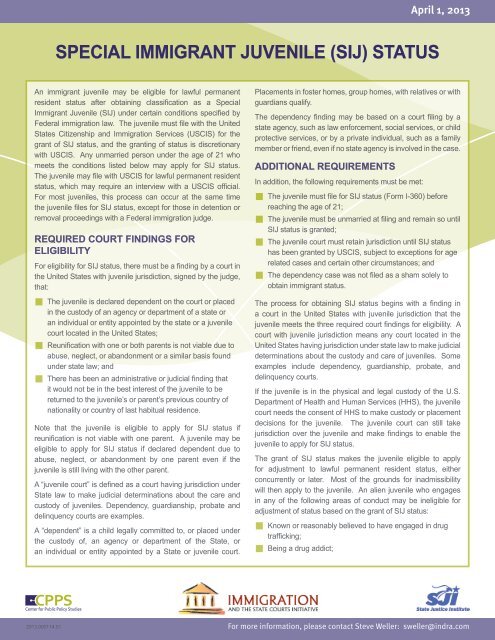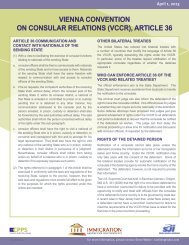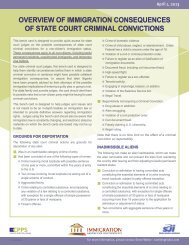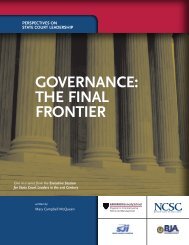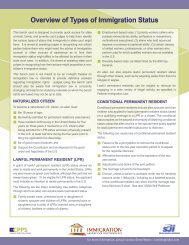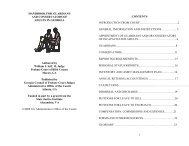SPECIAL IMMIGRANT JUVENILE (SIJ) STATUS
SPECIAL IMMIGRANT JUVENILE (SIJ) STATUS
SPECIAL IMMIGRANT JUVENILE (SIJ) STATUS
Create successful ePaper yourself
Turn your PDF publications into a flip-book with our unique Google optimized e-Paper software.
DRAFT<br />
April 1, 2013<br />
<strong>SPECIAL</strong> <strong>IMMIGRANT</strong> <strong>JUVENILE</strong> (<strong>SIJ</strong>) <strong>STATUS</strong><br />
An immigrant juvenile may be eligible for lawful permanent<br />
resident status after obtaining classification as a Special<br />
Immigrant Juvenile (<strong>SIJ</strong>) under certain conditions specified by<br />
Federal immigration law. The juvenile must file with the United<br />
States Citizenship and Immigration Services (USCIS) for the<br />
grant of <strong>SIJ</strong> status, and the granting of status is discretionary<br />
with USCIS. Any unmarried person under the age of 21 who<br />
meets the conditions listed below may apply for <strong>SIJ</strong> status.<br />
The juvenile may file with USCIS for lawful permanent resident<br />
status, which may require an interview with a USCIS official.<br />
For most juveniles, this process can occur at the same time<br />
the juvenile files for <strong>SIJ</strong> status, except for those in detention or<br />
removal proceedings with a Federal immigration judge.<br />
Required Court Findings for<br />
Eligibility<br />
For eligibility for <strong>SIJ</strong> status, there must be a finding by a court in<br />
the United States with juvenile jurisdiction, signed by the judge,<br />
that:<br />
QQ<br />
The juvenile is declared dependent on the court or placed<br />
in the custody of an agency or department of a state or<br />
an individual or entity appointed by the state or a juvenile<br />
court located in the United States;<br />
QQ<br />
Reunification with one or both parents is not viable due to<br />
abuse, neglect, or abandonment or a similar basis found<br />
under state law; and<br />
QQ<br />
There has been an administrative or judicial finding that<br />
it would not be in the best interest of the juvenile to be<br />
returned to the juvenile’s or parent’s previous country of<br />
nationality or country of last habitual residence.<br />
Note that the juvenile is eligible to apply for <strong>SIJ</strong> status if<br />
reunification is not viable with one parent. A juvenile may be<br />
eligible to apply for <strong>SIJ</strong> status if declared dependent due to<br />
abuse, neglect, or abandonment by one parent even if the<br />
juvenile is still living with the other parent.<br />
A “juvenile court” is defined as a court having jurisdiction under<br />
State law to make judicial determinations about the care and<br />
custody of juveniles. Dependency, guardianship, probate and<br />
delinquency courts are examples.<br />
A “dependent” is a child legally committed to, or placed under<br />
the custody of, an agency or department of the State, or<br />
an individual or entity appointed by a State or juvenile court.<br />
Placements in foster homes, group homes, with relatives or with<br />
guardians qualify.<br />
The dependency finding may be based on a court filing by a<br />
state agency, such as law enforcement, social services, or child<br />
protective services, or by a private individual, such as a family<br />
member or friend, even if no state agency is involved in the case.<br />
Additional Requirements<br />
In addition, the following requirements must be met:<br />
QQ<br />
The juvenile must file for <strong>SIJ</strong> status (Form I-360) before<br />
reaching the age of 21;<br />
QQ<br />
The juvenile must be unmarried at filing and remain so until<br />
<strong>SIJ</strong> status is granted;<br />
QQ<br />
The juvenile court must retain jurisdiction until <strong>SIJ</strong> status<br />
has been granted by USCIS, subject to exceptions for age<br />
related cases and certain other circumstances; and<br />
QQ<br />
The dependency case was not filed as a sham solely to<br />
obtain immigrant status.<br />
The process for obtaining <strong>SIJ</strong> status begins with a finding in<br />
a court in the United States with juvenile jurisdiction that the<br />
juvenile meets the three required court findings for eligibility. A<br />
court with juvenile jurisdiction means any court located in the<br />
United States having jurisdiction under state law to make judicial<br />
determinations about the custody and care of juveniles. Some<br />
examples include dependency, guardianship, probate, and<br />
delinquency courts.<br />
If the juvenile is in the physical and legal custody of the U.S.<br />
Department of Health and Human Services (HHS), the juvenile<br />
court needs the consent of HHS to make custody or placement<br />
decisions for the juvenile. The juvenile court can still take<br />
jurisdiction over the juvenile and make findings to enable the<br />
juvenile to apply for <strong>SIJ</strong> status.<br />
The grant of <strong>SIJ</strong> status makes the juvenile eligible to apply<br />
for adjustment to lawful permanent resident status, either<br />
concurrently or later. Most of the grounds for inadmissibility<br />
will then apply to the juvenile. An alien juvenile who engages<br />
in any of the following areas of conduct may be ineligible for<br />
adjustment of status based on the grant of <strong>SIJ</strong> status:<br />
QQ<br />
Known or reasonably believed to have engaged in drug<br />
trafficking;<br />
QQ<br />
Being a drug addict;<br />
2013.000114.01<br />
For more information, please contact Steve Weller: sweller@indra.com
DRAFT<br />
QQ<br />
Having engaged in prostitution;<br />
QQ<br />
Violation of protection order;<br />
QQ<br />
Use of false documents; or<br />
QQ<br />
Having a mental condition that is a threat to others.<br />
Violent offenses, sex offenses, and gang activity are particularly<br />
problematical, as they often can lead to denial of any immigration<br />
benefit.<br />
The Issue of Age<br />
To assure that the juvenile remains eligible for <strong>SIJ</strong> status, the<br />
juvenile court must retain jurisdiction until the juvenile is granted<br />
<strong>SIJ</strong> status. If juvenile jurisdiction terminates at age 18 under<br />
state law, USCIS will not deny the petition if the record shows<br />
that the termination of jurisdiction was solely due to age.<br />
While a person under the age of 21 may file for <strong>SIJ</strong> status under<br />
Federal immigration law, some states do not permit a finding of<br />
dependency for a person who has reached the age of 18. In<br />
those states a person who has not been declared dependent<br />
before reaching the age of 18 will not be eligible to apply for <strong>SIJ</strong><br />
status.<br />
For proof of age, USCIS regulations provide that the applicant<br />
submit documentary evidence of the alien’s age, in the form of<br />
a birth certificate, passport, official foreign identity document<br />
issued by a foreign government, such as a Cartilla or a Cedula,<br />
or other document which in the discretion of the director<br />
establishes the beneficiary’s age.<br />
The Effects of Juvenile Delinquency<br />
Proceedings<br />
A delinquency court can be the source of findings making a<br />
juvenile eligible for <strong>SIJ</strong> status.<br />
A juvenile delinquency determination is not considered an adult<br />
criminal conviction.<br />
QQ<br />
What constitutes juvenile delinquency is to be determined<br />
by Federal law.<br />
QQ<br />
Federal law defines a juvenile as anyone under the age<br />
of 18, and juvenile delinquency as an act committed by a<br />
juvenile that would be a crime if committed by an adult.<br />
QQ<br />
Certain crimes committed by juveniles may be considered<br />
adult criminal convictions under Federal law<br />
Juvenile delinquency proceedings may still carry risks for a<br />
juvenile. The disqualifying factors for adjustment of status<br />
listed above do not require a criminal conviction to make an<br />
alien inadmissible or deportable, so a juvenile who admits to<br />
any of those areas of conduct in the context of a delinquency<br />
proceeding may then be ineligible for adjustment of status.<br />
Note that a juvenile who engages in prostitution may be eligible<br />
for a T Visa, as a juvenile who engages in commercial sex can<br />
be considered a victim of a severe form of trafficking without<br />
having to show coercion under Federal law.<br />
Further, USCIS may look at evidence of bad acts, including<br />
evidence from a delinquency proceeding, in determining<br />
whether to exercise discretion on behalf of an applicant for a<br />
variety of forms of discretionary immigration relief, including<br />
naturalization.<br />
Engaging in Prostitution<br />
Engaging in prostitution can make a juvenile ineligible for<br />
adjustment of status, even if the juvenile’s behavior is not<br />
classified as criminal under state law. On the other hand, the<br />
juvenile may be eligible for a T visa under 8 U.S.C 1101(a)(15)<br />
(T) as a victim of a severe form of trafficking as defined by the<br />
Trafficking Victims Protection Act (TVPA), 22 U.S.C 7102 and<br />
7105.<br />
Effect on Family Immigration<br />
A person who becomes a Lawful Permanent Resident through<br />
<strong>SIJ</strong> status will no longer be considered the child of his or her<br />
parents for immigration purposes, even if parental rights were<br />
not terminated. The child will thus not be able to use the<br />
lawful status attained through <strong>SIJ</strong> status as a means to obtain<br />
lawful status for his or her parents. This bar applies to both<br />
parents, even if <strong>SIJ</strong> status was obtained due to abuse, neglect,<br />
or abandonment by only one parent. It also applies even if<br />
parental rights were not terminated.


